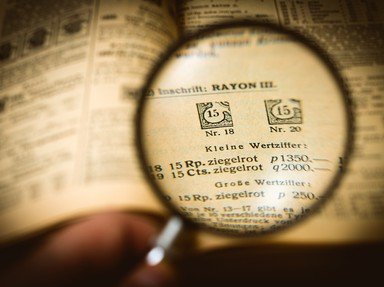Quiz Answer Key and Fun Facts
1. Professor Tome told Detective Dingo: "I have studied rare and antiquarian books for my entire career. I traveled to the 11th century, 1000 through 1099 to be precise, and saw the original copies of four important volumes." Despite his claim, he could not have seen one of the following books in the 11th century - which one?
2. In a shaky voice, Miss Occident said to Detective Dingo: "On my voyage to China in the 1100s, I saw examples of four amazing inventions." Which of the following would it have been impossible for her to see in 12th century China?
3. Monsignor Fidelis reported his time voyage to Detective Dingo: "I have always dreamed of meeting the great saints of the 1200s. I'm quite an expert in the field, you see. It was a thrill to talk theology with these four great men of the church." Which of the following men would it have been impossible for the Monsignor to meet in the 1200s, that man being long departed?
4. Madame Mortis: "I don't care what you think, Detective Dingo, I'll tell you frankly I have a fascination with death. When better than the 1300s to indulge my morbid tastes? I saw four events which devastated the population of Europe during that century." Which of the following events could she not have observed during the 1300s?
5. Admiral Imperio: "I traveled to the 1400s to secure myself a position on the crew of four important voyages of exploration - I have a professional and personal interest in the history of European Imperial expansion." Which of the following events could the Admiral not have witnessed in the 1400s?
6. Lady Louvre spoke passionately: "Imagine the excitement with which I set out to meet the men behind some of the greatest works of art ever created. In the 1500s I watched four great masters crafting their masterpieces." Which of the following men could she not have met during the 1500s?
7. Mr. X, still wearing the powdered peruke which had been his disguise, announced: "I suppose you'll be bored by the details of my time-trip, but I will tell you I went tete-a-tete with some of the most brilliant mathematicians of the 1600s." Which of the following could he not have conversed with in the 1600s?
8. Mademoiselle Guillotine looked a little shaken: "The face of popular revolt is not as glamorous as I had imagined, but I'm glad I had a chance to view first hand four great revolutions of the 1700s." Which of these events did not occur in the 1700s?
9. Dr Hippocrates: "As a doctor, I am all too aware that some medical discoveries of the nineteenth century remain vital tools in the twenty-first century. I bought my ticket to the 1800s so that I could witness four landmark medical breakthroughs." Which of these events could he not have witnessed during the 1800s?
10. Ms Melody, humming quietly to herself, spoke up: "Any tune I hear I can immediately sing back, and I will never forget it, but I can never remember words. That's why I like musicals with one-word titles. I went to view the debut performances of four great musicals of the 1900s." Which of these did not debut in the 1900s? (Solution revealed in extra information).
Source: Author
looney_tunes
This quiz was reviewed by FunTrivia editor
Pagiedamon before going online.
Any errors found in FunTrivia content are routinely corrected through our feedback system.
